|
|
|
Sort Order |
|
|
|
Items / Page
|
|
|
|
|
|
|
| Srl | Item |
| 1 |
ID:
081240


|
|
|
|
|
| Publication |
2008.
|
| Summary/Abstract |
This article argues that the Indonesian case is characterised by at least two important variations on the thesis of a transition from developmental to cultural nationalism. First, the transition took place with the establishment in 1966 of Soeharto's New Order, much earlier than in most other countries, and was associated less with neoliberal policies than with a pronounced capitalist bias which could be combined either with statist or economically liberal policies. Second, the variants of cultural nationalism that have been most openly adopted by Indonesia's postcolonial state have been multicultural rather than exclusionary in orientation. The article provides an overview of the transition from developmental to (multi)cultural nationalism in Indonesia in the mid-1960s. These changes are highly visible in the Indonesian context because each successive political regime has defined its identity in large measure by its particular nationalism. Since the Indonesian state has historically been the main site for power struggles within the political elite, the changes over time in nationalist ideology reflect quite closely the changing political and economic fortunes of particular elements within this elite. They also indicate how elites are trying to define their relations to other groups in Indonesian society, and how they are adapting to constraints imposed, and opportunities presented, by a changing national and global political economy
|
|
|
|
|
|
|
|
|
|
|
|
|
|
|
|
| 2 |
ID:
081236
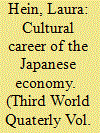

|
|
|
|
|
| Publication |
2008.
|
| Summary/Abstract |
This essay explores the connection between the economy and cultural identity in Japanese nationalism and the intellectual discourses that have historically defined it. Nationalism in the pre-war period was closely associated with the anxiety that Japanese modernity was deformed. After World War II Japan was part of the global trend towards developmental nationalism, including a transformation of its economy into both a wealthy and a highly egalitarian one. In the 1970s and 1980s ethnic nationalism re-emerged, this time arguing that economic success was the product of Japanese cultural uniqueness rather than of the developmental nationalist policies of the previous quarter-century. The economic downturn of the 1990s thus challenged Japan both economically and culturally, and reawakened anxieties about Japanese deformity. At first, this crisis led to a critical re-evaluation of national culture, manifested as serious attempts to both resolve tensions with Asia dating from World War II and to dismantle domestic social hierarchies. By the mid-1990s, however, this moment had passed and government and business leaders adopted fully fledged neoliberal policies, reversing the long postwar trend towards income equality, also expressing a more strident and militarist cultural nationalism
|
|
|
|
|
|
|
|
|
|
|
|
|
|
|
|
| 3 |
ID:
081239


|
|
|
|
|
| Publication |
2008.
|
| Summary/Abstract |
Reform era China has witnessed the simultaneous production of a middle class and increasing socioeconomic inequality. The ideological counterpart of this development is a new form of cultural nationalism that stands in striking contrast to Maoist developmentalism and in striking conformity with neoliberal logics. This article explores this shift in Chinese nationalism and national ideology by looking at the rejection of the language of class and the adoption of social strata as the language of social analysis. This shift has produced a new model of citizenship which seeks to manage the newly stratified society by articulating inequality as cultural difference in a hierarchy of national belonging. At the same time this neoliberal ethos is in dialogue with calls for social responsibility by left-liberal intellectuals in the wake of a rising number of popular protests and a growing concern about social inequality. This essay will discuss aspects of middle-class formation in China's economic reforms, first, by exploring its textual production as a category for social scientific analysis and social critique. Then it will explore how middle-classness becomes represented in mass media forms such as advertising as a new form of identity that is staged in anticipation of its realisation as a widespread social phenomenon
|
|
|
|
|
|
|
|
|
|
|
|
|
|
|
|
| 4 |
ID:
081245


|
|
|
|
|
| Publication |
2008.
|
| Summary/Abstract |
This article argues that a strong form of developmental nationalism lay at the root of the consolidation of the nation-state in Iraq. The Islamic communal and cultural nationalisms which came with the failures of developmentalism and the slide towards progressively liberal economic policy were exacerbated successively by the privations of war with Iran, the sanctions regime and the ongoing civil war. The last, in particular, casts doubt on the continuation of the Iraqi nation-state. Iraq may thus represent the direst unfolding of the transition from developmental to cultural nationalisms threatening the end of the nation-state itself. Drawing on comparisons with the economic strategies of other Middle Eastern states-where the politics of nationalism were highly implicated in the development agendas of the 1950s and 1960s and the economic liberalisation policies of the 1970s and 1980s-the article argues that the policies of the Iraqi state became the main focus of political action within its borders as soon as the state came into existence. Contrary to widespread notions about the 'artificiality' of the Iraqi state, and thus the 'naturalness' of its possibly impending dismemberment along ethnic and religious lies, Iraq's unravelling, if it happens, will have been the result of the increasing competition for control over local resources by regional and sectarian leaders-a struggle made possible, even necessary, by the disintegration of the mechanisms of centralised governance under the US- and Britain sponsored regime
|
|
|
|
|
|
|
|
|
|
|
|
|
|
|
|
| 5 |
ID:
081246
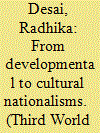

|
|
|
|
|
| Publication |
2008.
|
| Summary/Abstract |
That developmental and cultural nationalisms had opposite foci should not imply that developmental nationalisms comprised only political economy and cultural nationalisms only cultural politics. It does mean, however, that within each of these historical types of nationalism (and presumably other such historical categories may be elaborated by improving the still rudimentary framework we propose and extending it to other periods in nationalisms' history) both aspects acquired a distinctive settled form. This conclusion indicates the chief ways in which the contributions illuminate, elaborate and interrogate the political economy and cultural politics of developmental nationalisms and of cultural nationalisms and the transitions between them. One-sidedly, it emphasizes coherence, conformity and elaboration, where possible in the voices of the contributors themselves, leaving the task of reflecting on dissonances and the outstanding questions the contributors raise, fittingly perhaps, for a future station in the journey of this idea.
|
|
|
|
|
|
|
|
|
|
|
|
|
|
|
|
| 6 |
ID:
081243


|
|
|
|
|
| Publication |
2008.
|
| Summary/Abstract |
Pakistan features an exceptional and complex form of the transition from developmental to cultural nationalism. This paper traces the emergence of an Islamist cultural nationalism beginning in the 1970s that eventually surrendered to a trans-national 'Shariatisation' of Pakistani nationalism under pressure from Pakistan's involvement in geopolitical processes beyond its control. However, the roots of these varied discourses also lie in trends that became influential among British India's Muslims in the 19th and early 20th centuries. Their further development was shaped by the formative weaknesses of the Pakistani state and nationalism, which matured in the context of the Afghan civil war and the onset of the US 'war on terror' in the new century. Together they gave rise to the paradoxical evolution of an Islamic cultural nationalism into a trans-national ideology which challenged the very basis of the state. Given the vulnerability of civil society since the 1980s, and the subordination of Islamic parties to a military-dominated state that has resorted to Islam as a legitimiser, the role of the armed forces in shaping this nationalism acquired greater importance than in most other societies. The paper concludes with some reflections on the implications of Pakistan's unique trajectory for the fate of nations and nationalisms generally
|
|
|
|
|
|
|
|
|
|
|
|
|
|
|
|
| 7 |
ID:
081237
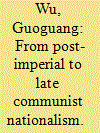

|
|
|
|
|
| Publication |
2008.
|
| Summary/Abstract |
This article compares Chinese nationalism of the 1990s with the historic beginning of modern Chinese nationalism in the 1910s and argues that they are two different nationalisms. While the post-imperial May Fourth nationalism of the 1910s arose in a poor and backward China to seek wealth and power for the nation, the 1990s saw the resurgence of nationalism rooted in China's late communist authoritarian prosperity. Following a Weberian framework to examine nationalism's connections with material interests, political power and cultural orientations, the paper finds that the Chinese nationalism of the 1990s reversed all the radical features of early 20th century developmental and cosmopolitan nationalism, as it defended the Chinese model of development, endorsed political authoritarianism, and sought sources of legitimacy and identity in traditional Chinese culture
|
|
|
|
|
|
|
|
|
|
|
|
|
|
|
|
| 8 |
ID:
081241
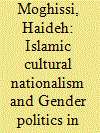

|
|
|
|
|
| Publication |
2008.
|
| Summary/Abstract |
Over two decades of women's resistance and ceaseless efforts to overcome gender barriers in post-revolutionary Iran demonstrate that developmentalist policies of the ancien r gime positively changed women's self-image and expectations. Regardless of the incomplete, deformed and debased character of modernisation forces, they opened possibilities for women that the new regime has not been able to take back through re-Islamisation policies, whether by persuasion or coercion. More important than small successes in pushing back the Islamists' offensives is women's new-found confidence in challenging the Muslim reformists' position on issues of women's rights, exposing the limits of reforms achievable under a religious state
|
|
|
|
|
|
|
|
|
|
|
|
|
|
|
|
| 9 |
ID:
081235


|
|
|
|
|
| Publication |
2008.
|
| Summary/Abstract |
This paper interrogates the terms 'developmental nationalism' and 'cultural nationalism' to conclude that, because developmental nationalisms always have cultural elements and cultural nationalisms, developmental ones, the precise, and varied, meanings of 'development' and 'culture' demand careful scrutiny, as do the shifting proportions of their combinations in different ideological - political formations and in the confrontations and partial accommodations between, and across, diverse nationalist traditions. The central argument is that we might get a better purchase on the developmental/cultural nationalism transition in the Indian case in juxtaposition with the problematic of poverty. Indian intellectuals turning towards self-conscious nationalism often placed the poverty of the country at the heart of their nationalism, making it basically a critique and the nation still in need of 'making' or constitution. The alternative has been to project the nation (or, with votaries of 'communal' politics-religious communities, Hindu or Muslim) as in every case an always already established glorious entity, with a resplendent history and culture, free of blemishes other than those imposed by external invasion or domination. Through four sets of case studies of these opposing traditions at four moments in the history of modern India, the focus here is on degrees of fetishisation of the nation, and their consequences in terms of the strengthening, or subversion, of hierarchies and power relations.
|
|
|
|
|
|
|
|
|
|
|
|
|
|
|
|
| 10 |
ID:
081242


|
|
|
|
|
| Publication |
2008.
|
| Summary/Abstract |
The prominent Thai scholar, Chatthip Natsupha, has gone from being a Marxist intellectual in the 1970s to a cultural nationalist advocate of a genuine Thai essence which, he believes, is an antidote to the dominance of the Western neoliberal capitalism. His case is not an anomaly. The intellectual path from the Marxist left to the cultural nationalist right is well-trodden and reflects broader changes in nationalism in the country. The cultural nationalist Thai ex-left rejected what it called 'bad' nationalism and embraced a 'good' one. However, its ideas were significantly drawn from conservative nationalism. Such nationalism, which is widespread among the Thai intelligentsia, was an important factor in their support for the military coup which, in 2006, ousted an elected government on the dubious grounds that it was a proxy for global capitalism
|
|
|
|
|
|
|
|
|
|
|
|
|
|
|
|
| 11 |
ID:
081244


|
|
|
|
|
| Publication |
2008.
|
| Summary/Abstract |
This paper examines the relationship between developmental and cultural nationalism through an extended case study of the Sri Lankan conflict. It highlights, in particular, the deeply political process of the construction of nations in which the usual opposition between politics and an anti-political realm of the nation or culture itself plays an important role. The conflict, it is argued, has to be understood first of all in political terms, as the outcome of a specific history of electoral politics which, from the 1930s on, was structured along 'ethnic' lines. Appeals to the national or the cultural, which often appear in rhetorical opposition to the divisive forces of everyday politics, are nevertheless themselves products of the very political processes they claim to transcend
|
|
|
|
|
|
|
|
|
|
|
|
|
|
|
|
| 12 |
ID:
081234
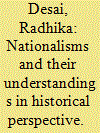

|
|
|
|
|
| Publication |
2008.
|
| Summary/Abstract |
This introduction provides the historical and intellectual historical context for our thesis of the transition from developmental to cultural nationalisms. After settling issues of definition and periodisation in relation to nations, nationalisms and the international order, I outline how, in all the main phases in the three-century long birth of the international world out of one of empires, capitalist and precapitalist, in tandem with the spread of capitalism (and initially, imperialism), nations and nationalisms were understood and, often revealingly, misunderstood. Three main distorting factors accounted for the misunderstandings: 1) the implication of nations and nationalisms in the spread of capitalism was ignored; 2) their role, in comparison with imperialism, the other major geopolitical dynamic of the past few centuries, was underestimated; and 3) capitalism was understood, one-sidedly, as a universalising force, a prejudice reinforced by imperialism (especially when it was largely the imperialism of one country, England, in the 19th century). The universal Enlightenment intellectual temper also played a role and it is not surprising, in retrospect, that scholarship on nationalism burgeoned precisely at the time, in the last third of the 20th century, when attention to difference and particularity and the questioning of universal thinking became the leading intellectual trend. This scholarship, however, only accentuated the dominant tendency to understand nations culturally, in separation from political economy and it proved unable to stall the force of the mistaken 'globalisation' thesis about the decline of nations and nationalisms. Throughout this discussion critical insights which more-or-less escaped these distortions and detected the intertwining of culture and political economy in nationalism are noted.
|
|
|
|
|
|
|
|
|
|
|
|
|
|
|
|
| 13 |
ID:
081238
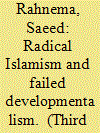

|
|
|
|
|
| Publication |
2008.
|
| Summary/Abstract |
The rise of radical Islamism in recent years does not limit the applicability of the concept of cultural nationalism. Rather the two are intertwined in ways which this article will attempt to highlight. Islam took specific national forms as modern nation-states arose and the contemporary resurgence of radical Islamism also follows that modern pattern. I examine the emergence of the three most important movements in the Islamic world, namely, the Muslim Brotherhood in Egypt, Jama'at-e Islami in Pakistan and Khomeinism in Iran. I argue that imperialism, authoritarianism and the contemporary rise of radical Islamism are closely related. More particularly, the latter is the complex product of failed modernisation programmes, failed developmentalism under the auspices of international capital and in collaboration with the local propertied classes, and corrupt, undemocratic governments throughout the Islamic world. The failure of secular left and liberal nationalist movements to attract mass-based support has also contributed to the strengthening of radical Islamists. The article concludes that the mobilising power and populist appeal of radical Islamists can be challenged effectively only if the social, economic and political factors that give rise to these movements in the first place are eliminated.
|
|
|
|
|
|
|
|
|
|
|
|
|
|
|
|
|
|
|
|
|